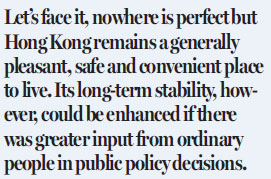Two decades after the handover HK is as clean and efficient as ever
Updated: 2017-06-21 07:39
By Peter Mann(HK Edition)
|
|||||||
I am a typical Hong Kong citizen. When in town, I moan and groan about the place because I love it and want to make it better. When I'm abroad I defend it to the hilt. I was also one of those people getting very wet in a near non-stop monsoon downpour at Tamar 20 years ago, witnessing the withdrawal of British administration from Hong Kong. In the Cantonese language, "water" has the same meaning as "money" so locals were upbeat about Hong Kong's future as a special administrative region of China. Despite constant bleating and dire predictions of doom in some quarters, about how Hong Kong is going downhill along with the loss of its cherished freedoms and individual rights, and its seeming unresolvable political paralysis, I think we should stand back and take a look at how Hong Kong is actually doing as a place to live and work compared to other world cities.
Post-handover Hong Kong has basically maintained its rule of law and freedom of speech and certainly preserves its legendary efficiency - you can buy anything just down the road, get a new business registered in one working day and even get your TV fixed on Christmas Day. It has always been a safe place to live, protected by a highly professional police force, whose reputation has unfortunately been tarnished for having to take resolute action to protect public safety in the face of violent street protests. Yet where else in the world can schoolchildren travel alone on public transport in a place where there are no inner-city no-go areas? Or a woman can go anywhere unaccompanied any hour of the day without safety concerns. It also happens to have one of the best public transport networks in the world, where buses, trains and ferries run on time and the MTR is still the envy of other cities, many of which have actually tried to emulate its success in combining efficient transport with property development. What of corruption? Hong Kong's government is squeaky clean compared to most places in the region. You don't have to pay extra for government services or to expedite license processing. What makes Hong Kong special? Its magnificent harbor, cosmopolitan lifestyle and the fact that 75 percent of its land area is countryside, with an astonishing wealth of bio-diversity. Notwithstanding the Agriculture, Fisheries and Conservation Department's attempts to pour concrete on ancient boulder pathways and development projects in village enclaves, the magnificent country park network (40 percent of the SAR's land) is one of the main assets that distinguish Hong Kong from other cities in the region. And it is accessible within half an hour from any point in the urban centers. Indeed, the SAR is a model for future cities because its high-rise development minimizes urban sprawl and provides highly accessible countryside and marine environments. The territory also has lovely beaches and a vibrant boating culture. These could all be major tourist draws if the parks and beaches were given as much promotion as the city's shopping malls. How about Hong Kong's health service? Local hospitals provide high-quality service but similarly to the United Kingdom's National Health Service, treatment can be slow. In this case it might be a good idea to go to a private doctor for diagnosis first. I had major surgery in the Prince of Wales Hospital some years ago and thought that the doctors and service were outstanding. However, many Hong Kong people unfairly look down on public hospitals. Most of them have health insurance and the city's private hospitals are among the most expensive in the world. Insurance tends to distort the market so policy-holders receive more expensive treatment than they actually need. Better private and public sector cooperation in the health sector would ensure the resources of both could be maximized.

The education sector is in a similar position. The universities, international and private schools are world-class although government schools need reform. Ambitious parents are often forced to move into the catchment areas where the best schools are to be found.
Hong Kong remains very business-friendly when it comes to setting up a company and profits tax is low at 15 percent. Let's face it, nowhere is perfect but Hong Kong remains a generally pleasant, safe and convenient place to live. Its long-term stability, however, could be enhanced if there was greater input from ordinary people in public policy decisions.
The author is a former government administrative officer and Wan Chai district officer. He recently published his memoir Sheriff of Wan Chai covering his various postings in the civil service.
(HK Edition 06/21/2017 page8)